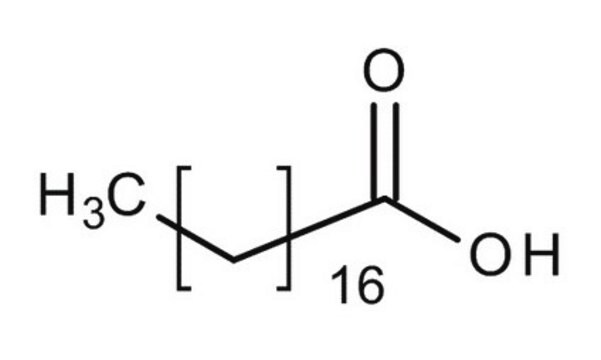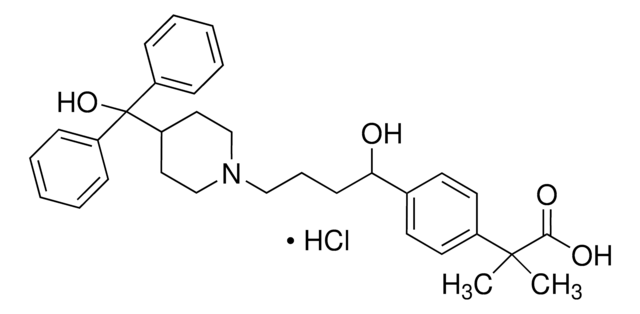1621008
USP
Stearic acid
United States Pharmacopeia (USP) Reference Standard
Synonym(s):
1-Heptadecanecarboxylic acid, C18:0, Cetylacetic acid, NSC 25956, NSC 261168, Octadecanoic acid, Stearophanic acid
About This Item
Recommended Products
grade
pharmaceutical primary standard
vapor pressure
1 mmHg ( 173.7 °C)
API family
stearic acid
manufacturer/tradename
USP
bp
361 °C (lit.)
mp
67-72 °C (lit.)
solubility
acetone: soluble
benzene: freely soluble
chloroform: freely soluble
ethanol: soluble
ether: freely soluble
propylene glycol: soluble
water: practically insoluble
density
0.845 g/cm3
application(s)
pharmaceutical (small molecule)
format
neat
SMILES string
CCCCCCCCCCCCCCCCCC(O)=O
InChI
1S/C18H36O2/c1-2-3-4-5-6-7-8-9-10-11-12-13-14-15-16-17-18(19)20/h2-17H2,1H3,(H,19,20)
InChI key
QIQXTHQIDYTFRH-UHFFFAOYSA-N
Looking for similar products? Visit Product Comparison Guide
Related Categories
General description
Application
- Palmitic Acid
- Calcium Stearate
- Sodium Stearate
- Aluminum Monostearate
- Glycerin Suppositories
- Magnesium Stearate
Analysis Note
Other Notes
related product
Storage Class Code
11 - Combustible Solids
WGK
nwg
Flash Point(F)
Not applicable
Flash Point(C)
Not applicable
Regulatory Listings
Regulatory Listings are mainly provided for chemical products. Only limited information can be provided here for non-chemical products. No entry means none of the components are listed. It is the user’s obligation to ensure the safe and legal use of the product.
JAN Code
1621008-500MG:
Choose from one of the most recent versions:
Certificates of Analysis (COA)
Sorry, we don't have COAs for this product available online at this time.
If you need assistance, please contact Customer Support.
Already Own This Product?
Find documentation for the products that you have recently purchased in the Document Library.
Customers Also Viewed
Our team of scientists has experience in all areas of research including Life Science, Material Science, Chemical Synthesis, Chromatography, Analytical and many others.
Contact Technical Service






